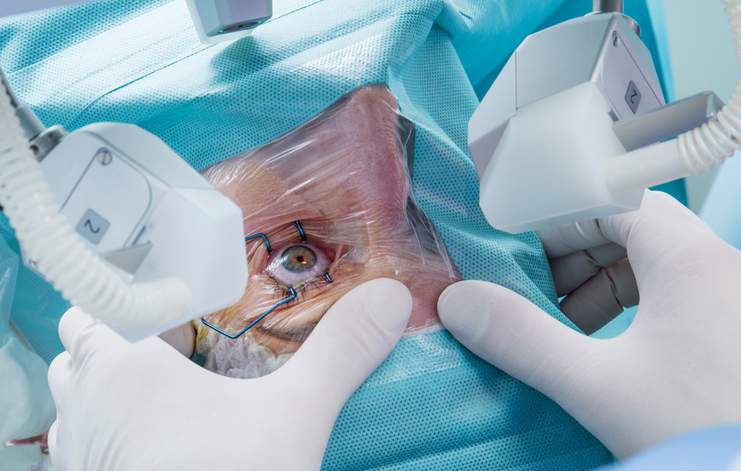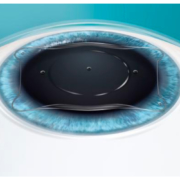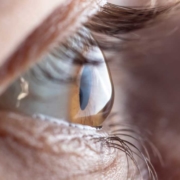What is PRK Surgery? The Basics Explained
By Dr. Anthony Nappi / May 24, 2022 / 10 min. read

Laser eye surgery was granted a patent over 30 years for correcting vision problems. PRK surgery is a popular option for those looking to fix their vision.
You may be wondering what is PRK in eye surgery and am I a candidate? Read on to learn who is a good fit for PRK surgery and what to expect during the process.
What is PRK Eye Surgery?
Photorefractive Keratectomy (or PRK for short) is a type of laser eye surgery. It treats nearsightedness, farsightedness, and astigmatism. It reshapes the cornea to correct these vision problems if your eye does not bend light correctly.
PRK eye surgery can lessen the need for glasses or contact lenses. Some people do not need corrective lenses at all after surgery.
Who is a Candidate for PRK Surgery?
There are certain criteria that you will need to meet to qualify for PRK laser eye surgery. PRK is a great choice for those with thin corneas who cannot have LASIK surgery. Those with dry eyes are also good candidates for PRK surgery.
To be a candidate for PRK you must:
- Have a stable prescription for at least one year
- Be within the refractive limits PRK can treat
- Be in good health
- Have healthy corneas and eyes
- Be older than 18 years of age
Meet with your eye doctor to discuss your eligibility for PRK surgery. They will assess the condition of your eyes to decide if PRK surgery is right for you.
PRK Consultation
Before you go in for PRK surgery, you will have a consultation with your eye doctor to discuss your lifestyle. You will work together to discover what your vision needs are. You can then create a plan for surgery.
Chat with your doctor about your expectations after surgery. If you plan on having perfect vision post-surgery, you may be disappointed. Your doctor can help you understand the typical outcomes of PRK surgery.
You will also have a full eye exam with your ophthalmologist. They will test your vision and check for any problems in the eyes. They will also measure and create a map of your cornea to use for surgery and check pupil size.
On the day of surgery, you can eat a light meal and take all prescription medications. Remove bulky jewelry that may get in the way during surgery, and don’t wear eye makeup.
PRK Procedure
PRK is an outpatient surgery that takes around 15 minutes to complete. You remain awake during surgery but won’t feel any pain.
- The eye surgeon will numb your eyes with an anesthetic before starting surgery.
- A holder will get placed in the eye to prevent blinking.
- The outer layer of your cornea (epithelium) is removed. The surgeon will use a brush, blade, laser, or alcohol solution.
- The eye doctor will use the laser to reshape your cornea. It gets calibrated for your eye measurements.
- The surgeon will give you eye drops that are anti-inflammatory and antibiotic.
- A clear contact lens will be applied to lessen irritation while healing from surgery.
PRK Recovery
After surgery, you will not be able to drive yourself home, so plan for a friend or family member to help you. You may have blurry vision after PRK for about a week post-surgery. Avoid strenuous activity and try to rest as much as possible to promote healing.
Studies have shown that 90% of patients feel no pain after PRK surgery. The other 10% of patients reported only mild to moderate pain for up to 72 hours post-surgery. Your doctor may tell you about pain relief eye drops for any discomfort.
You should wear sunglasses outside to prevent sun exposure to the cornea, as it can cause scarring. Ask your doctor about how much you should use your eyes during recovery for things like reading and computer work. These activities may be difficult at first and cause strain on your eyes.
PRK Surgery Success Rate
After PRK surgery, it takes time for your vision to stabilize so you can experience the results. After one month, vision tends to improve by 80% and up to 95% after three months. About 90% of those who get PRK surgery have 20/40 vision or better three months post-operation.
How Long Does PRK Last?
PRK surgery is permanent; the results will not go away over time. However, it cannot prevent your eyes from aging. During your early to mid-40s, you will most likely find that you need reading glasses.
PRK Surgery Side Effects
Every type of eye surgery has risks and side effects. You may experience some of the following after PRK surgery. PRK is a safe and effective form of laser eye surgery.
- Cornea scars
- Cloudy or hazy vision
- Infection
- Halo effect when around lights
- Eye pain or irritation
- Watery eyes
- Light Sensitivity
It is not easy to say what the outcomes will be for each patient. Every person has a unique healing rate and may experience post-surgery differences.
PRK vs. LASIK
Both PRK and LASIK are laser eye surgeries that correct refractive vision issues. They both reshape the cornea using lasers. There are a few differences between the two, though.
During PRK, the surgeon will remove and discard the epithelium. The eye gets left exposed before reshaping the cornea. This layer will grow back during the healing process.
During LASIK surgery, the surgeon moves the epithelium out of the way by creating a flap. It remains attached to the eye during surgery and gets replaced after completion.
You need enough corneal tissue to be a candidate for LASIK. PRK is an alternative option for those who do not have enough to create a flap of corneal tissue.
Is PRK Right for You?
PRK eye surgery is a safe and effective treatment for nearsightedness, farsightedness, and astigmatism. It reshapes the cornea and can reduce your need for eyeglasses or contacts during daily activities. PRK surgery is permanent, so you never need to worry about the results wearing off.
Can I Take Ibuprofen before LASIK?
There are no limitations to taking Ibuprofen before surgery, so you can do that if you wish. But it is recommended that you take Ibuprofen or Tylenol after the surgery because it can help you feel more comfortable as the numbing drops in your eyes wear off.
PRK Surgery In Phoenix
If you think you might be a candidate for PRK surgery, contact your eye doctor for more information. If you are in the Metro Phoenix, AZ area, contact our office today for a free consultation. We will help you discover the possibilities for laser eye correction surgery.





 iStock
iStock iStock
iStock
